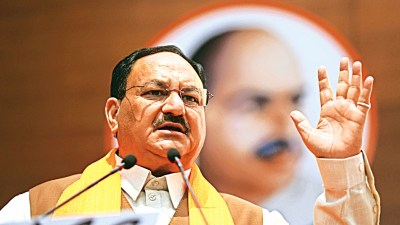Quite right, Sir Humphrey
A commission for Administrative Reforms sounds like a good idea. But such reforms are often an exercise akin to a dog trying to catch its ow...

A commission for Administrative Reforms sounds like a good idea. But such reforms are often an exercise akin to a dog trying to catch its own tail. Discussions on this theme remind me of the two great Applebys of public administration. The first is Sir Humphrey Appleby, a secretary in the department of administrative affairs under the hapless Jim Hacker in the TV series, Yes, Minister. The first episode begins with the minister stating that the inefficient bureaucracy needs to be reformed. Sir Humphrey promptly produces a plan proving that the bureaucracy is not so inefficient after all. But what follows is a tour de force display of how much bureaucracies can seem to change things without changing them.
The second great Appleby is Paul Appleby who, in the good old days when Nehru could freely employ foreign consultants, produced a report on public administration in 1953. This report is striking in many respects. While he was generally complimentary to the government, his Report shows how the constitutive weakness of the government was already an issue in 1953. Too little expert knowledge, inappropriate hierarchies, too much diffusion of responsibility, inability to prioritise, great inter-service rivalry, too many invidious distinctions between line and staff functions between planners and implementers, too many rules, too much distrust in the exercise of discretionary power, no sense of opportunity cost and, finally, what he called 8220;lack of action mindedness8221; were already considerable issues. What is astonishing is that, more than 50 years later, the Report still rings true.
Appleby grasped something about administrative reform that few of his successors have. Administrative reforms should not be confined to small technicalities like recruitment rules, supervision procedures, accounting practices, etc. In the name of reform, it is likely that we will counter pedantry with even more pedantry. For example, the proposal to recruit civil servants at a younger age is a self-defeating proposition. Our problem is that we have too many people who do not understand anything of the world other than government, and recruiting younger people seems like a mad idea in this context. Or take our approach to financial oversight. As Appleby said, 8220;one is struck the most by the extensiveness of efforts to guard and control even in terms of very small amounts. The procedures under which purchases are controlled extends to such laborious lengths in terms of such small amounts as to involve many times the real cost of any possible savings in the particular purchase8221;. We have such clamour for rule-based solutions that we might end up making government even less nimble.
The government has to grasp this fundamental fact: there8217;s no administrative solution to the challenge of administrative reform. Successful reform will have to be about a different political philosophy. As Appleby hinted, successful reform will have to debate the role of government and how it is embedded in wider society. There are several issues that any serious reform needs to take on board. The first and most obvious is: what is the role of government? Too much of the dissipation of government energy has come from it doing too many things it should not. A recent World Bank report on governance in Punjab suggests that only less than half the time of senior civil servants is spent on actual policy issues. We have to grasp this fundamental fact that adding a single file to the government8217;s roster is ensuring that something important does not get done. A government without clear objectives cannot get administrative clarity.
Second, what is the relationship between government power and social hierarchies? If we think that the state is an instrument of social mobility rather than a contrivance for delivering services, no reform can take place. Can government be a mechanism to overcome invidious class distinctions within its own ranks, let alone in its relationship with wider society? Third, what is the relationship between government and the communities it serves? Is it possible to design government that empowers, rather than merely serves? Will we have the basic trust in citizens to decentralise? How is the gap between the clamour for empowerment at the local level, and the temptation to order from the top, going to be bridged? Fourth, what does it mean to have a government that is mission driven and not rule bound, action minded rather than procedure obsessed? Again, as Appleby pointed out, the balance between rules and discretion in any administrative system is a delicate issue. But our rules ensure that while the devious can, with ingenuity, get away, the good officers are deterred from taking the necessary decisions.
Appleby surmised that trust was, on aggregate, more likely to produce more results than the pathological distrust enshrined in our accounting procedures. Just as outcomes are not outlays, accountancy is not the same as accountability. Fifth, can so many of our absurd laws, usually enacted somewhere between circa 1870 and 1935, be reformed? Absurd laws compound administrative rigidity. Sixth, is the government in a position to mobilise the best available knowledge? How will it create networks and be flexible enough to respond to demand for high degree professional knowledge? Can the government, while doing its core functions, not inhibit the development of markets? How will the government generate social returns on investment rather than be a drain on resources? Can we come up with monitoring mechanisms; contract designs that intelligently self-implement, rather than create newer and newer agencies. Finally, what is the relationship between administration and politics?
This list could go on. Sir Humphrey Appleby said that government ministries do the opposite of their nomenclature. Industries ministers ensure that the government has less industry, the department of education ensures that we remain less educated, and so forth. This may seem hyperbolic, but it is not too far off the mark. What Arun Shourie calls the 8220;sclerosis in government8221;, cannot be reduced by as bloodless an initiative as administrative reform, which will not be able to subvert the energies of the more humourless Humphrey Applebys sitting behind desks. Administrative Reform is not the same thing as Reinventing Government. It would be tragic if we confused the two.
- 01
- 02
- 03
- 04
- 05































